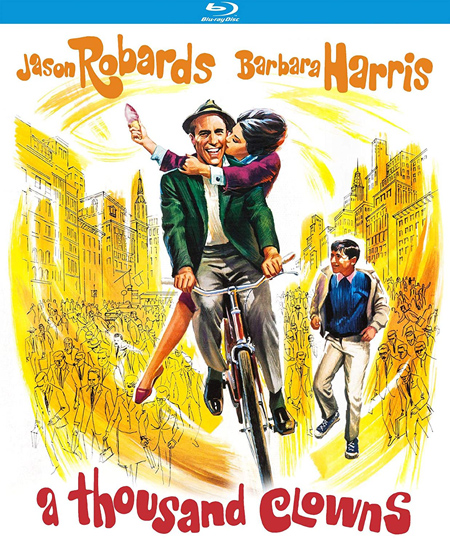
“ADULT
WITH SIDEKICKâ€
By
Raymond Benson
Perhaps
what might have been an unexpected Oscar nominee for Best Picture of 1965 was A
Thousand Clowns, an adaptation of the Broadway play written by Herb Gardner
(who also penned the screenplay and was nominated for his work). Fred Coe had
directed the stage production, which garnered Tony nominations for Best Play,
Best Featured Actor (Barry Gordon, who was around 14 at the time), and awarded
Sandy Dennis a trophy for Featured Actress. Just about everyone involved in the
Broadway production went on to make the film, also directed by Coe, except,
oddly enough, Dennis (who was replaced by Barbara Harris, who is quite
wonderful in the part). Martin Balsam is also new to the film, replacing Larry
Haines, and Balsam walked away with an Oscar for Best Supporting Actor for his
role as Jason Robards’ savvy brother and manager.
While
Jason Robards (Jr.) as Murray Burns is the tale’s protagonist, it is indeed
young Barry Gordon as Murray’s nephew, Nick, who steals the movie. Gordon went
on to star in a few other films, several television series episodes and
programs, and eventually served the longest as a president of the Screen Actors
Guild.
The
year is 1965. Murray is a comedy writer who used to work for a Soupy Sales-type
children’s comic, Leo “Chuckles the Chipmunk†Herman (Gene Saks), but he quit
in frustration and is enjoying life as an unemployed bum. His nephew Nick lives
with him in a cluttered studio apartment in the city (Murray’s sister left Nick
with Murray six years earlier and disappeared). The pair have lived together
comfortably and have become a sort of adult-with-sidekick team. One day, the
State Child Welfare board becomes concerned by Nick’s unusual intellectualism
at school, so they send two social workers, Sandra Markowitz and Albert
Amundsen (Barbara Harris and William Daniels) to investigate Nick’s living
situation and interview his guardian. It does not go well. While stuffy and
self-righteous Albert wants to take Nick away from Murray, Sandra sympathizes
with what she views as a healthy relationship between the uncle and nephew—and
she also begins a relationship with Murray. The expected crisis does come,
though—and either Murray must get a job or Nick will indeed be removed.
While
A Thousand Clowns is 75% comedy, there is a serious through-line about
responsibility, conformity, and what it means to be “family†that elevates the
picture to more meaningful fare. Coe directs the picture in the style of the
French New Wave (e.g., radical editing and jump cuts), which was hot at the
time but had not yet been fully embraced by Hollywood as a way to make
mainstream pictures. This could be one reason why the movie was honored by the
Academy at Oscar time.
Another
plus with the film is the “opening up†of the play’s one-room setting by taking
the characters onto the streets of mid-sixties Manhattan. This is a joy,
especially for anyone who knows the city. At one point, Murray and Nick are
strolling past Lincoln Center—and it’s under construction! The
Metropolitan Opera building can be seen in the background covered by
scaffolding and machinery. Amazing.
Kino
Lorber’s new high definition restoration looks remarkably good and clear in its
widescreen black and white glory. Of note is the supplemental video interview
with today’s Barry Gordon, who is still recognizable as Nick, 55 years later.
He provides some wonderful insights into his career as a child actor and the
making of the film. The disk also includes the trailer for this and other Kino
Lorber releases.
A
Thousand Clowns is
a slice of life, a piece of history, and a good time for anyone interested in excellent
stage-to-film adaptations, fine acting, and a New York City milieu.
CLICK HERE TO ORDER FROM AMAZON
